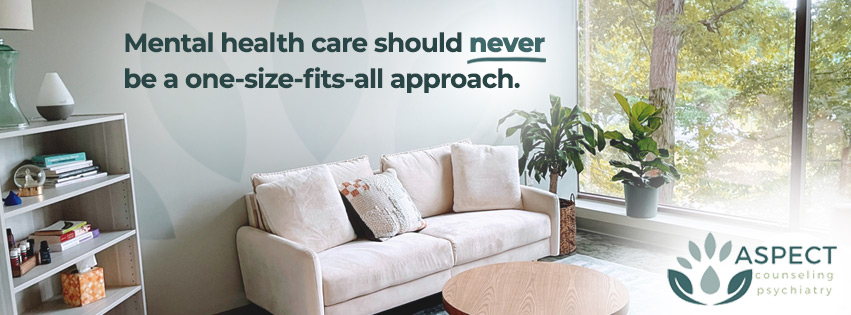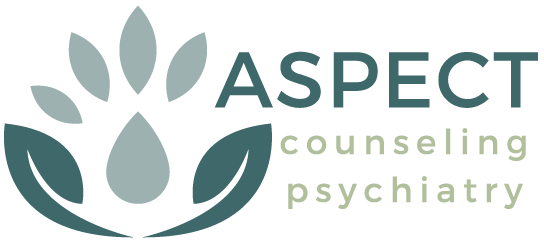If you’re looking for therapy for depression in Richmond, VA, our licensed therapists are here to help. Almost all of our therapists offer treatment for depression in a variety of forms.
At Aspect Counseling and Psychiatry, our therapists work closely with our board-certified nurse practitioners to provide a continuity of care. This can include both therapeutic interventions alongside medication.

- Our depression therapists are available for in-person sessions in Richmond, VA, as well as telehealth throughout Virginia
- Almost all of our therapists & nurse practitioners (PMHNPs) work with clients struggling with depression
- We never take a one-size-fits-all approach; every client is unique
- Our PMHNPs work alongside our depression therapists to help diagnose conditions, run tests, and prescribe medication, if needed
- Postpartum depression is real, and several of our therapists have experience working with new moms
If you’re still curious how a depression therapist might be able to help, let’s talk about the signs & symptoms of depression, specific types like postpartum depression, and the types of therapy we use to treat it.
- What Is Depression?
- Depression & Anxiety: How They Are Linked
- Postpartum Depression & Therapy
- How Our Depression Therapists Can Help
- How We Use Therapy to Treat Depression
- How a PMHNP Can Help Treat Depression
- What to Expect During a Depression Therapy Session
- Depression Therapy FAQs
- Our Therapy Office
- Get Started with Depression Therapy Today
What Is Depression?
Depression is more than just feeling sad or going through a rough patch; it’s a serious mental health condition that can affect every part of your life. People with depression may struggle with low energy, lack of motivation, and feelings of hopelessness. It can interfere with work, relationships, and daily responsibilities.
If you’re searching for “depression therapists near me” in Richmond, VA, you’re already taking the first step toward healing. With the right support and treatment, depression is highly manageable.
Depression & Anxiety: How They Are Linked
Depression and anxiety often occur together. In fact, many people experience overlapping symptoms:
- Restlessness and irritability
- Trouble sleeping or concentrating
- Feeling overwhelmed or hopeless
- Constant worry or racing thoughts
Understanding the link between depression and anxiety helps therapists create treatment plans that address both conditions. Effective therapy can target both sets of symptoms, leading to lasting relief.
Postpartum Depression & Therapy
Postpartum depression affects many new mothers and can appear weeks or months after childbirth. It’s not a sign of weakness. It’s a real medical condition that requires support and treatment.
Postpartum depression therapists can:
- provide coping strategies to manage overwhelming feelings
- help new mothers navigate changes in identity and relationships
- offer practical tools to reduce guilt, shame, and isolation
With specifically tailored postpartum depression therapy, mothers can regain balance and enjoy time with their babies and families.
Learn more about our postpartum depression therapists in Richmond:
How Our Depression Therapists Can Help
Our team of depression therapists in Richmond, VA specializes in evidence-based treatments tailored to each client’s needs. We provide:
- One-on-one counseling sessions focused on your goals
- Holistic approaches that address mind, body, and lifestyle
- A safe, non-judgmental space to process emotions
- Support for families and loved ones, when needed
Our goal is not just to help you feel better, but to give you long-term tools for ongoing support.

Allison Ernest
PMHNP-BC, RN, MSN

Amber Zarger
LCSW

Carla Crews
LCSW

Carlie Powers
LMFT, CST, CAADC

Gabby Scalzo
PhD, LCP

Jennifer Peele
PMHNP, FNP-BC, APRN

Jonathan Yoder
PMHNP-BC

Josh Barefoot
LPC

Kristina Gilbert
LPC

Laurie Manns
LPC, CSAC

Leigh Carter
PMHNP-BC, RN, MSN

Lindsey Bowers
LPC

Michelle Kempf
LPC

Mikeyda Travers
LPC

Molly Iracane
LCSW

Paula Connolly
LCSW

Rachel Salinas
LPC

Robyn D’Reaux-Rodgers
LCSW

Ryan Ernest
PMHNP-BC

Shenika Whitaker-Carlos
LCSW, CSOTP
How We Use Therapy to Treat Depression
There are several effective forms of psychotherapy for depression. The most common include:
Cognitive Behavioral Therapy
Helps reframe negative thought patterns.
Dialectical Behavior Therapy
Focuses on emotional regulation and acceptance.
Interpersonal Therapy
Addresses relationship challenges that contribute to depression.
Group Therapy
Provides peer support and shared coping strategies.
Each person’s experience with depression is unique, so treatment is tailored to fit your individual needs.
CBT for Depression
Cognitive Behavioral Therapy for depression is one of the most effective, research-backed methods available. CBT helps clients:
- Identify negative thought patterns
- Challenge self-critical beliefs
- Build healthier coping mechanisms
- Develop practical problem-solving skills
With practice, CBT empowers clients to break the cycle of depression and regain control over their lives.
DBT Therapy for Depression
Dialectical Behavior Therapy (DBT) was originally developed for people with intense emotional struggles, but it is also highly effective for depression. DBT focuses on:
- Mindfulness: Staying grounded in the present moment
- Emotion Regulation: Learning to manage intense feelings
- Distress Tolerance: Building resilience during difficult times
- Interpersonal Effectiveness: Strengthening communication and relationships
By practicing these skills, our clients develop tools that reduce depressive symptoms and improve daily functioning.
How a PMHNP Can Help Treat Depression
Sometimes, therapy alone may not be enough. A Psychiatric Mental Health Nurse Practitioner (PMHNP) can play an important role in treatment.
PMHNPs work closely with therapists to:
- provide psychiatric evaluations
- prescribe and manage medications, if needed
- monitor progress and adjust treatment plans
This collaborative approach ensures clients receive comprehensive, well-rounded care.
What to Expect During a Depression Therapy Session
Starting therapy can feel intimidating, but knowing what to expect helps ease anxiety. In your first session, your depression therapist will:
- ask about your symptoms, history, and goals
- create a personalized treatment plan
- begin teaching coping skills you can use right away
As therapy continues, you’ll gain insights into your thought patterns, learn new strategies for managing emotions, and build confidence in your ability to handle challenges.
Depression Therapy FAQs
If you’re just learning about therapy for depression and want to learn more, here are a few questions that might help.
If feelings of sadness, hopelessness, or fatigue are interfering with your daily life, it may be time to seek professional help.
Yes—research shows that psychotherapy, especially CBT and DBT, is highly effective for reducing depressive symptoms.
Every client is different. Some people begin to feel better after a few months, while others benefit from ongoing support.
Not always. Many clients improve significantly with therapy alone. If medication is recommended, our PMHNPs can guide you through the process.
Yes. Our office accepts many forms of insurance, including medicare. Check our insurance page for a complete list of insurance providers.
Yes, your privacy is fully protected. Sessions are confidential and provide a safe space for healing.
Our Therapy Office
Our therapy office is located in the heart of West End Richmond, in the Innsbrook business complex—at the crossroads of I-64, I-295, Hwy 288, and West Broad St. We share the Liberty Plaza I building with several law offices, financial services companies, and other Richmond-area businesses, at the corner of Cox Rd. & North Park Dr.
4801 Cox Road, Suite 205
Glen Allen, VA 23060
Directions →

Get Started with Depression Therapy Today
If you’re searching for depression therapists near you in Richmond, know that help is available. Our team of specialists offer compassionate, evidence-based care designed to help you feel like yourself again.
Call us today or use the button below to schedule your first session.

